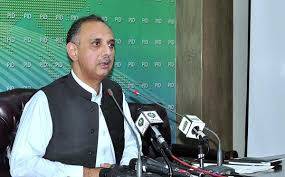Islamabad - Defending the recent hike of Rs0.83 per unit in electricity tariff, Minister of Power Omer Ayub Khan has once again hold the previous PMLN government responsible for the jump and said that PTI has no role in the increase as they were compelled to do so. The PMLN government had hold the increase of Rs226 billion in power tariff and willfully didn’t increase the power tariff for one and a half year, therefore PTI government had to make difficult decisions, Minister of Power Omer Ayub Khan told a press conference here Thursday.
When the minister was asked that how he was holding the previous government responsible for the rate hike as the time period for which the increase was made comes under PTI tenure, Omer Ayub replied that the previous government should have filed the petition in this regard in advance. Ironically the recent increase of Rs0.83 per unit on account of periodic adjustments for 3rd and 4th quarters of FY 2018-19 and annual indexation adjustment of distribution margin comes during the tenure of PTI government.
PTI government during past few months have twice increased the power tariff and transferred burden of around Rs270 billion to the power consumers. Omer Ayub said that PML(N) had left land mines behind them in shape of not revising the power tariff for 18 months and signing expensive electricity agreements.
He said that the previous government had installed expensive electricity generation plants. He said that PTI is not responsible for the price hike as it is the result of the wrong policies of the previous government. He said that with recent price hike the government will help to collect the revenue of Rs80 billion. The minister said that Rs25 billion of Rs80 billion will be spent on system up-gradation while Rs55 billion will go in Circular debt.
He said that through passing Rs0.30 per unit to the consumer using above 300 unit electricity, the government has tried to save the poor class from rate hike. The government has transferred the burden, from poor, to those who could afford it, he added. Omer Ayub claimed that the hike in electricity prices will not affect 75 percent of the domestic consumers. He said that the government is trying to reduce the power rates through various measures and coming months and years the result will be visible.
The government has started crackdown against electricity theft, trying to control the circular debt and working on adding cheaper renewable energy to the system. He said that by increasing efficiency and crackdown on electricity theft, in the past eight month the power sector has collected Rs121 billion extra revenue. He said that the PTI government has made no discrimination among the power thieves. “Anyone involves in power theft is thief and we will deal him like thief,” he added.
The minister said that flow of circular debt was Rs38 billion per month during previous government which has been reduced to Rs35 billion per three months. He said government is taking steps to introduce new renewable energy projects in the country which by the end of day will help in reducing the electricity prices. The Minister said there is no load shedding on eighty percent of the feeders. He said that foreign companies want to invest in Pakistan and they are coming in droves. The minister said that Saudi Arabia is investing $4 billion in Pakistan.
NNI: Ambassador of France to Pakistan Marc Baréty has stated that Pakistan has immense potential for investment as a large number of French companies are investing in the country. Amid an interact with Minister for Power Division Omar Ayub in Islamabad on Thursday, Ambassador Marc Baréty stated thousands of megawatts of electricity would be produced utilizing natural flow on Indus River. The Ambassador said that the several French companies are working in energy sector in Pakistan. Minister for Power Division Omar Ayub has said that there are huge opportunities of foreign investment in Pakistan’s energy sector.






